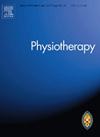抑郁症的人与腰痛:爱尔兰肌肉骨骼分诊物理治疗师的筛选和转诊实践的横断面描述性调查
IF 3
3区 医学
Q1 REHABILITATION
引用次数: 0
摘要
背景:腰痛(LBP)伴发抑郁症时,预后较差。肌肉骨骼(MSK)分诊物理治疗师临床评估LBP转介到公立医院门诊等候名单的显著比例。目的建立MSK分诊物理治疗师的抑郁症筛查和转诊做法,并比较抑郁症筛查与红旗(如马尾综合征)和黄旗(如恐惧回避信念)筛查的置信度。方法采用描述性横断面设计,在伦理批准后,向爱尔兰成人公立医院门诊服务的MSK分诊物理治疗师分发了定制的电子调查。结果共完成问卷调查36份,回复率55%。少数受访者(3/ 36,8%)直接向所有LBP患者询问抑郁症,而超过三分之一(13/ 36,36%)从未筛查过抑郁症。报告的障碍包括缺乏培训或技能、时间限制和缺乏转诊途径。对抑郁症筛查的信心低于对红旗或黄旗的信心。有一些迹象表明,一天或更长时间的训练提高了抑郁症筛查的信心和实践。本研究旨在深入了解当前LBP患者的抑郁症筛查实践以及影响MSK分诊物理治疗师决策的因素。结论本组MSK分诊物理治疗师直接筛查抑郁症的人数较少,且筛查置信度较低。了解当前的过程和实践的决定因素,包括有针对性的培训的潜在积极影响,可能支持改善抑郁症筛查实践的策略。•据作者所知,这是第一项研究,详细介绍了由高级实践角色的MSK分诊物理治疗师在LBP患者队列中的抑郁症筛查实践。•与筛查危险信号或黄信号相比,这项研究提供了关于筛查抑郁症信心的新信息。•来自这一利基临床医生群体的研究结果可能反映了全球MSK分诊物理治疗师的情况。虽然这项研究的重点是LBP人群,但我们希望它能鼓励读者在筛查抑郁症时反思自己的信心和实践,这可能也与其他患者群体有关。本文章由计算机程序翻译,如有差异,请以英文原文为准。
Depression among people with low back pain: a cross-sectional descriptive survey of Irish musculoskeletal triage physiotherapists’ screening and referral practices
Background
Low back pain (LBP) is associated with a poorer prognosis when there is concomitant depression. Musculoskeletal (MSK) triage physiotherapists clinically assess a significant proportion of LBP referrals to public hospital outpatient waiting lists.
Objectives
To establish depression screening and referral practices of MSK triage physiotherapists, and to compare confidence in depression screening to red flag (e.g. cauda equina syndrome) and yellow flag (e.g. fear avoidance beliefs) screening.
Methods
Using a descriptive cross-sectional design, a bespoke e-survey was distributed to MSK triage physiotherapists in adult public hospital outpatient services in Ireland following ethical approval.
Results
Thirty-six surveys were completed and submitted (55% response rate). A minority of respondents (3/36, 8%) directly ask all patients with LBP about depression, while more than one third (13/36, 36%) never screened for depression. Reported barriers included lack of training or skill, time constraints, and absence of referral pathways. Confidence in screening for depression was lower than for red flags or yellow flags. There was some indication that a day or more of training improved depression screening confidence and practice.
Discussion
This study provides insight into current depression screening practices for people with LBP and the factors influencing decision-making among MSK triage physiotherapists working in advanced practice roles.
Conclusion
Few MSK triage physiotherapists in this sample directly screen for depression, and screening confidence was low. Understanding the current processes and determinants of practice, including the potential positive impact of targeted training, may support strategies to improve depression screening practices.
Contribution of the Paper
- •This is the first study, to the authors’ knowledge, that details depression screening practices in a cohort of LBP patients by MSK triage physiotherapists in advanced practice roles.
- •This study presents novel information on confidence in screening for depression compared to screening for red flags or yellow flags.
- •The findings from this niche group of clinicians are likely reflective of MSK triage physiotherapists worldwide. While the study focused on LBP populations, we hope that it encourages readers to reflect on their own confidence and practice when screening for depression, which may also be relevant to other patient groups.
求助全文
通过发布文献求助,成功后即可免费获取论文全文。
去求助
来源期刊

Physiotherapy
医学-康复医学
CiteScore
6.40
自引率
3.00%
发文量
377
审稿时长
82 days
期刊介绍:
Physiotherapy aims to publish original research and facilitate continuing professional development for physiotherapists and other health professions worldwide. Dedicated to the advancement of physiotherapy through publication of research and scholarly work concerned with, but not limited to, its scientific basis and clinical application, education of practitioners, management of services and policy.
We are pleased to receive articles reporting original scientific research, systematic reviews or meta-analyses, theoretical or debate articles, brief reports and technical reports. All papers should demonstrate methodological rigour.
 求助内容:
求助内容: 应助结果提醒方式:
应助结果提醒方式:


